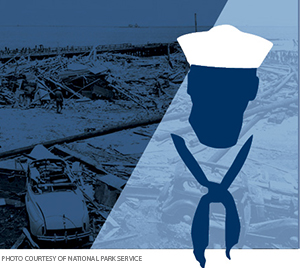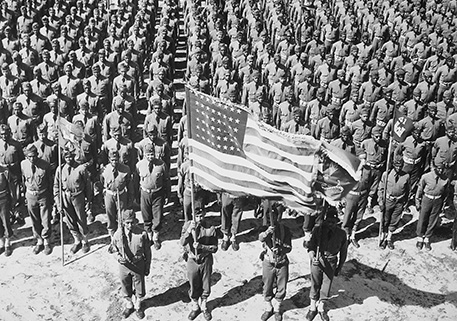 All that is left of a little-known World War II military base on the southern banks of Suisun Bay in California are its skeletal remains. Ravaged by time and Mother Nature, Port Chicago Naval Magazine is all but lost to history—except for the fight that remains to ensure a tragedy there nearly 80 years ago is properly rectified.
All that is left of a little-known World War II military base on the southern banks of Suisun Bay in California are its skeletal remains. Ravaged by time and Mother Nature, Port Chicago Naval Magazine is all but lost to history—except for the fight that remains to ensure a tragedy there nearly 80 years ago is properly rectified.
As the ammunition depot at Mare Island Naval Shipyard, California, struggled to keep pace with supplying the U.S. war efforts in the Pacific, Port Chicago was expanded into a munitions facility that allowed for two ships to be loaded at a time.
The units assigned to work there were made up of Black sailors who were not trained in munitions handling, which—along with the frenetic pace of loading and disregard for safety—led to disaster on the evening of July 17, 1944.
As the cargo ships SS Quinault Victory and SS E.A. Bryan sat in dock, packed with high-explosive incendiary bombs, depth charges and ammunition, an accident set off a fiery explosion. The eruption was so large it caused a seismic shock felt almost 50 miles away.
By the time the dust and debris from the explosions settled, 320 lives had been lost and approximately 400 others had been injured. Nearly two-thirds of those killed were Black sailors.
Despite the catastrophe, commanders failed to address safety and training issues and, less than a month later, ordered the remaining Black sailors to load more munitions. The sailors protested the lack of response with a work stoppage. Navy leadership viewed it as mutiny.
In September 1944, the Navy took away the pay of 208 sailors and gave them bad conduct discharges. The following month, 50 others were court martialed and found guilty. They were sentenced to between eight and 15 years of hard labor.
All were given clemency at the conclusion of the war, but they have not been exonerated. “We don’t want a pardon,” Joe Small, one of the Port Chicago 50, said in Robert L. Allen’s book “The Port Chicago Mutiny: The Story of the Largest Mass Mutiny Trial in U.S. Naval History.” “Because that means ‘you’re guilty but we forgive you.’ We want the decisions set aside.”
In 1994, a congressional review determined that racial discrimination played a part in the harsh sentences, but Navy Secretary John H. Dalton pointed out the men’s actions had been insubordinate and upheld the convictions.
One elected official, Rep. Mark DeSaulnier, whose 11th congressional district includes the Port Chicago site, continues to seek restorative justice for these sailors.
DeSaulnier has introduced a bill for exoneration four times, two of which passed the House before being defeated in the Senate.
“Fulfilling our nation’s founding promise of equality and justice for all requires confronting our past and working to right historical injustices,” DeSaulnier said in a press release.
“Black History Month is a time for our nation to celebrate the achievements of Black Americans while confronting its ugly past regarding race relations,” said DAV National Commander Joe Parsetich. “Though the sailors of the Port Chicago 50 are no longer with us, their service and sacrifice deserve to be honored.”






